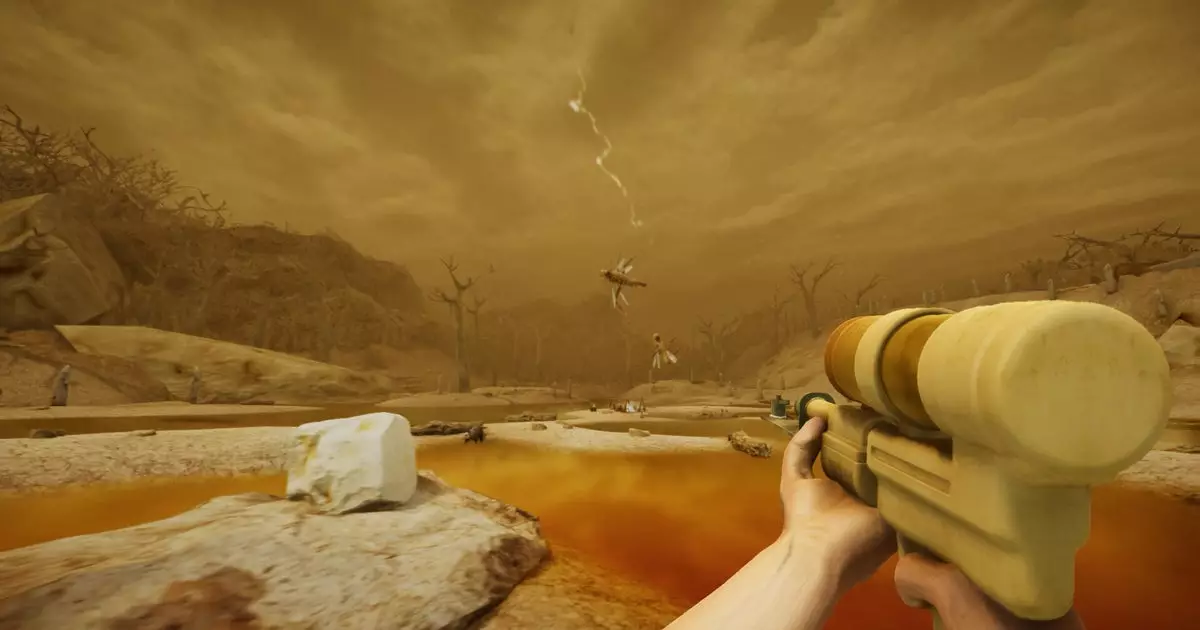In an era where innovation in gaming often means enhancing graphics or expanding storylines, the developers of Urge have courageously attacked conventions with a bizarre yet fascinating premise: a survival game that includes the often-avoided subject of bodily fluids. Initially, the idea of a video game centered around urine might provoke laughter or disgust, and rightfully so. However, as one delves deeper into Urge’s design, the whimsical absurdity transforms into an intriguing metaphor that navigates themes of survival, environmental responsibility, and even social critique.
The game’s setting— a vast open world shrouded in a peculiar fog reminiscent of a low-budget horror film— serves as both an aesthetic choice and a commentary on the degradation of our environment. Rather than utilizing the traditional game mechanics that deal with zombies or mutants emerging from a post-apocalyptic backdrop, Urge reinvents the danger by associating it with a substance that most would prefer to ignore. The fog, a product of excess urine that permeates the world, creates a rich tapestry of gameplay elements that challenge players to think critically about their actions and their consequences.
Central to the gameplay mechanics of Urge is an elaborate system that uses urine not just as a comedic gimmick but as a pivotal element influencing survival strategies within the game. Players must manage their character’s bodily functions while also navigating the treacherous landscape. The very act of urination becomes a strategic decision rather than a trivial task. Improper disposal leads to fog accumulation, which in turn attracts increasingly aggressive enemies, forcing players to balance their immediate needs against the larger implications of their choices.
This unique approach paints Urge as a much more than a run-of-the-mill shooter; it serves as a metaphor for real-world environmental issues. Just as pollution can worsen a community’s living conditions, players must be conscious of their virtual actions or risk drowning in an overwhelming haze of enemies and chaos. The challenge lies in survival intertwined with ecological stewardship, making for a refreshing change in gameplay focus.
Urge begins with the player emerging from a car crash, thrusting them into a whimsical and grotesque rendition of reality. Instead of using the familiar tropes of direct combat against common foes, players encounter mutated beings driven mad by their environment, feeding into the lore that connects human actions to the consequences felt by the world around them. One can make a compelling argument that Urge is more than a game—it is a creative social commentary wrapped in irony and dark humor.
The bizarre creatures roaming the landscape—from grotesque spiders bursting with yellow gelatinous goo to nightmarish humanoids draped in hazardous materials—both frighten and amuse, drawing players into confrontations that go beyond mere survival. The absurdity of these designs merges cleverly with the gameplay’s requirements, where the management of one’s bodily fluids becomes a necessity as vital as scavenging for food or building shelter. Through this lens, Urge hooks players with a compelling narrative that goes deeper than the surface humor associated with its premise.
While many may dismiss Urge at first glance due to its peculiar premise, a deeper exploration reveals a groundbreaking venture into the realm of indie gaming. The humor and oddity of the gameplay serve to engage players in thoughtful consideration of their actions and the resulting consequences. It challenges preconceived notions of what video games can be, pushing boundaries not only in themes but also in gameplay mechanics.
Developers are often afraid to challenge established conventions in a landscape saturated with polished but formulaic experiences. Urge, standing boldly apart, exemplifies the curious potential that arises from creatively embracing the absurd. It offers a kind of gaming experience that is not only meant to entertain but also to provoke thought and engagement with pressing real-world issues through fantastical means.
Urge transcends the simplicity of its premise to become a unique and meaningful experience. It urges players to reflect on their actions—whether they be in-game or in the real world—and highlights the delicate balance of nature and consequences. Far from being a mere curiosity, Urge might well inspire a new genre of ecologically minded gaming in the future.

